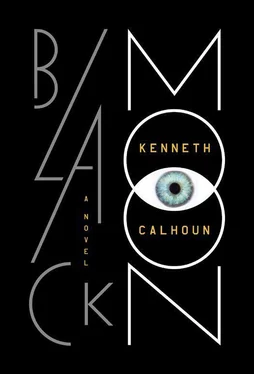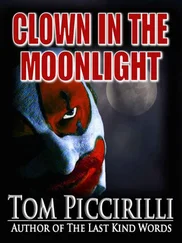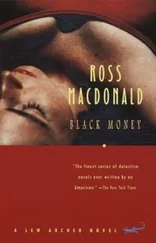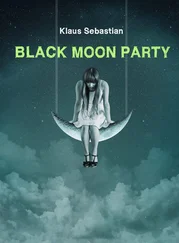He felt it watching him, so he jabbed his fingers through the hole, hoping to spear it. Nothing. The eye, he sensed, was just out of reach. He slapped a hand over the hole and, with his other, worked down the waders over that engorged part of himself—that persistent spike—so that they bunched stiffly around his knees. Now he would reach the eye, and blind it. He moved into position, keeping one hand over the hole.
To hear it scream, he knew, he had to scream first.
13

IT TOOK ONLY HALF A DAY’S DISTANCE from the warehouse, walking through abandoned industrial parks and wide expanses of dry brush toward the foothills, for Biggs to conclude that he still slept, still dreamed. The insomniac had died on his own. The man was at the end of his rope already, and all the activity pushed him over the edge. The rage caused something inside him to snap. Broke his jaw throwing himself against the cage or the floor. Then blew a fuse and that was that.
And the ring? It was Maria who had given it back to him, he had always suspected. Slipped it onto his finger as a gesture of goodwill—a refund since, after all, he didn’t require her services. Or maybe an exchange for his wallet, which was missing when he woke up.
He tested his syntax by saying, “I can still sleep, and dream.”
He repeated this as he approached a cluster of abandoned cars in a parking lot. Out of habit, he peered in the windows, hoping to see a key jutting from the ignition. He could try each door, search the under the seats and floor mats, check the visors and glove compartments. But he had learned that this was an unrewarding and time-consuming endeavor, especially with deliberately parked cars. Chances improved when the cars had been abandoned on the road, but because they had been ditched by sleepless drivers with the engine running, it was likely the gas had already been burned through.
He walked on, making his way to a wide avenue that extended up into the foothills, where large homes lined the ridges. Power line towers stood like skeletal sentries, positioned at receding intervals up the grade, arms burdened by the endless dead lines that sagged toward the earth.
The once impeccably landscaped lawn of the median had gone feral and was now up to Biggs’s chest in places. He could see trails pressed into the grass by other walkers, maybe coyotes. Overhead, palm fronds clattered and creaked in the wind. Doves cooed. He was tempted to curl up in the grass and reclaim some of the many lost hours of sleep, since he was still in the red. To dream again, to maybe see Carolyn—to draw her out of the dark margin of his eye. But that would be reckless. After all, it seemed to him that the sleepless were now drawn to him when he slept, moths to flame.
He walked on. A short distance up the avenue, he caught sight of a billboard. It was suspended on a wide trunk of steel, sitting three stories over a used car lot—an ad for a vacation getaway. The graphic was an expansive white sand beach. The impossibly blue water sat beyond, framed by an arch of coconut tree trunks. The copy read: INSERT TOES HERE. An arrow pointed to a spot in the sand. It was a campaign he had worked on. In fact, the line was his. This was his creative legacy, this sign.
When Biggs saw that its retractable ladder was lowered, he headed toward it. He had become attuned to possible safe havens, like the cage in the warehouse or the abandoned Humvee he had inhabited for a short nap what seemed like years ago. Yes, the danger was that a safe place could easily become a trap. And he wasn’t great with heights. But if he was able pull up the ladder behind him and somehow sleep out of view—maybe on the floor of the catwalk along the sign’s base, if he laid down some cardboard—the billboard’s location would be worth noting.
He picked his way through the used cars. As he neared the ladder, he realized it was suspended higher than it looked from a distance. He stood under it and leapt for the first rung, grazing it with his knuckles before dropping back to the hot pavement. He looked around for something to stand on. Come on, he told himself, you can reach it. He took a few running steps and jumped. This time he caught it with one hand, then, after a wild swing, the other. He groaned and lunged for the higher rung, and the next, until he could bring his feet up onto the lowest rung. Now able to stand, he climbed up the ladder to the iron grate landing of the billboard.
He saw that the ladder could not be prevented from dropping back down. The crank lock was broken. He could, if necessary, use one of his locks to hold it up.
He was pretty high up. It looked higher than it did from the ground. Maybe four stories. He felt the altitude in his knees and wished he had Carolyn’s fearlessness when it came to heights. How she insisted on checking the weather by leaning far out of their sixth story window. How she once sat in the window frame, one leg dangling over the alley far below, as she snapped pictures of a nearby fireworks show. Just seeing her perched there had given his stomach a turn.
And yes, there was the skylight. She had climbed through it at least once, maybe more, pulling herself up the frail hook pole. What had she done up there on the roof, where no one goes? She had gone up and out of view, into a blind spot. She returned to earth with her bare feet blackened by tar. Of course he was reminded that there was another time, a longer stretch of time, that she had once disappeared into. A more significant blind spot—a cave of darkness that had once held her for six weeks. Even now, standing in the shadow of his sign with the foothills of her family home in sight, his mind tried to peer into the opaque fog of that lost chapter.
She had barricaded herself there in her childhood bedroom over a year ago. She wanted isolation, she had explained, to get fully immersed in a new project. Biggs had reluctantly endorsed this abrupt residency, having witnessed her mounting distress at being unproductive for weeks. It was a block, she insisted, attempting to explain her sleepless nights and mood swings. She just needed some space to work through it. The literal space she had in mind was the studio she had fashioned in her walk-in closet during high school, when she made stop-motion cartoons with repurposed Barbie dolls and hacked action figures.
She had asked him not to visit her, and she never showed him the work she had done there. When she returned to the city, she refused to discuss her time away. She seemed drained of her desire to create. He was perplexed by her sudden lack of drive, and by the unceasing agitation that lay just under the surface. She had long suffered bouts of insomnia—a pioneer of sleeplessness whose struggles reached new heights over a year ago, when she returned from her father’s house. What had happened there? What did she find in that darkness—tumbling in that void—that seemed to hang like a dark veil in front of her face?
He believed it was possible that he’d find her there now. Maybe whatever it was could somehow be their salvation now that the world had been turned inside out.
He took his bearings, sighting his path onward from the mountain ridges. He looked over his shoulder at the blue wall of motionless and silent ocean—the massive decal of colored dots smoothed over the backboard. Maybe, when he found her, this is where they would come. Away from the cave. They could live out their days on this narrow metal ledge, the two of them, sheltered by one of his bright ideas. Beachfront property, he thought. It was a peaceful scene, a dream vacation. An empty, two-dimensional dream he had authored. Nothing like the turbulent dream sea that had brought them together, but real in its own way.
Читать дальше













